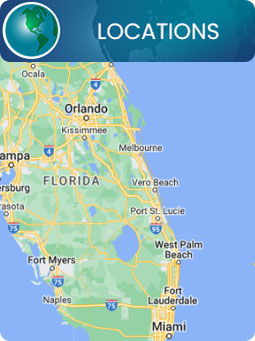Electromyography and Nerve Conduction Velocity (EMG/NCV) Testing Q&A
EMG and NCV tests can be performed to determine the cause of symptoms, such as numbness, tingling, and constant pain. Let our team of healthcare professionals help keep your health in check today! NCV and EMG tests are available at Global Neuro & Spine Institute. Visit us today, Dr. Michael S. Slobasky, DO, DABPMR, and his caring staff at Global Neuro & Spine Institute will treat you with care. For more information, contact us or schedule an appointment online. We have convenient locations in Orlando FL, Jensen Beach FL, Malabar Palm Bay FL, Atlantis FL, Fort Pierce FL, Winter Park FL and Plantation, FL.


Table of Contents:
What is NCV EMG test?
How long does EMG NCV test take?
What would cause a doctor to order a nerve conduction test?
What disorders can an EMG detect?
Tests for nerve conduction velocity (NCV) and nerve conduction studies (NCS) measure how fast electrical impulses pass through your nerves. Nerve damage can be detected by NCV.
You are stimulated by electrode patches attached to your skin during the test. Over your nerve, two electrodes are placed on your skin. Your nerve is stimulated by an electrode that sends a very mild electric current. Another electrode records the resulting electrical activity.
Taking the distance between electrodes and measuring how long it takes for an electrical impulse to travel between electrodes, the speed can then be calculated. An electromyography (EMG) can be performed in conjunction with this test. Your muscles’ electrical activity is measured with this device, and it is commonly performed at the same time as an NCV. These tests provide information about the presence, location, and extent of nerve and muscle diseases.
The duration of an EMG may range from 30 to 60 minutes. A nerve conduction velocity test can take between 15 minutes and an hour. The number of nerves and muscles your doctor tests will determine how long it will take.
A needle electrode will be inserted into a muscle during an EMG. The electrical activity of the muscle will be recorded while it is at rest. When the needle electrode is inserted into a muscle, you may experience a quick, sharp pain. While the electrical activity is being recorded, your doctor will ask you to tighten the same muscle slowly and steadily. It is possible for your doctor to move the electrode to a different muscle or to a different part of the muscle.
NCVs are performed by attaching two types of electrodes to your skin. Electrodes are used to stimulate a nerve with an electrical pulse. Other electrodes are placed over the muscles controlled by the nerve. The electrical pulse will be recorded for how long it takes the muscle to respond.
There are a couple of tests that can help you find out why your muscles are sore or weak. In addition to an EMG, NCV is often used to differentiate nerve disorders from muscle disorders. EMG detects whether the muscle is responding properly to the nerve’s stimulus whereas NCV detects problems with the nerve. It’s normal to experience soreness or numbness in a muscle occasionally. If you lift something heavy, for instance, you might strain a wrist muscle.
The cause of a sore wrist for many people is a nerve injury, not a muscle injury. These tests may be helpful when you don’t know why you have problems with your wrist, back, legs, or other body parts. Muscle and nerve disorders can be diagnosed using EMGs and nerve conduction studies. A nerve conduction study may also be performed to determine the cause of symptoms, such as numbness, tingling, and constant pain.
Several injuries and diseases that affect your motor nerves and muscles can be diagnosed using an EMG. It can be used to determine whether these injuries and diseases exist, where they are located, and how severe they are. EMG tests can also be used by providers to rule out conditions.
Disorders detected with an EMG include issues affecting the peripheral nerves such as carpal tunnel syndrome and issues with the nerve roots that exit your spinal column such as sciatica or pinched nerves. It may also be used to detect muscle disorders, conditions affecting the motor neurons in the spinal cord or brain, and conditions affecting the connection between the muscles and nerves.
NCV and EMG tests are available at Global Neuro & Spine Institute. Contact us for more information. We serve patients from Orlando FL, Conway FL, Edgewood FL, Jensen Beach FL, Ocean Breeze FL, Rio FL, Malabar Palm Bay FL, Melbourne FL, Atlantis FL, Palm Springs FL, Boynton Beach FL, Fort Pierce FL, White City FL, St Lucie FL, Plantation FL, Pine Island Ridge FL, Lauderhill FL, Winter Park FL, Bertha FL, Alafaya FL and surrounding areas.

CONDITIONS WE TREATED:
- Facet Joint Disorders
- Back Surgery Complications
- Migraines
- Herniated Discs
- Back Pain
- Lower Back Pain
- Neck Pain
- Sciatica Pain
- Abdominal Pain
- Compression Fractures
- Joint Pain Treatments
- Shoulder Pain Treatments
- Elbow Pain Treatments
- Hip Pain Treatments
- Knee Pain Treatments
- Diabetic Peripheral Neuropathy
- Complex Regional Pain Syndrome
- Pelvic Pain
- Occipital Neuralgia
- Chest Wall Pain
- Chronic Facial Pain
- Phantom Limb Pain
- Interstitial Cystitis – Pelvic Pain
- Herpetic Neuralgia
- Cervical Radiculopathy
- Degenerative Disc Disease
ADDITIONAL SERVICES
- Kyphoplasty
- Epidural Steroid Injection
- Posterior Facet Blocks – Rhizotomy
- Sacroiliac Joint Injection
- Percutaneous Discectomy
- Stellate Ganglion Blocks
- Intercostal Nerve Blocks
- Intra-Articular Peripheral Joint Injection
- Lumbar Epidural Steroid Injections
- Coccygeal Nerve Block
- Occipital Nerve Blocks / Rhizotomy
- Selective Nerve Root Blocks
- Discography
- Hardware Blocks
- Cluneal Nerve Block
- Spinal Cord Stimulators
- Sympathetic Nerve Blocks
- Headaches Treatments

CONDITIONS WE TREATED:
- Facet Joint Disorders
- Back Surgery Complications
- Migraines
- Herniated Discs
- Back Pain
- Lower Back Pain
- Neck Pain
- Sciatica Pain
- Abdominal Pain
- Compression Fractures
- Joint Pain Treatments
- Shoulder Pain Treatments
- Elbow Pain Treatments
- Hip Pain Treatments
- Knee Pain Treatments
- Diabetic Peripheral Neuropathy
- Complex Regional Pain Syndrome
- Pelvic Pain
- Occipital Neuralgia
- Chest Wall Pain
- Chronic Facial Pain
- Phantom Limb Pain
- Interstitial Cystitis – Pelvic Pain
- Herpetic Neuralgia
- Cervical Radiculopathy
- Degenerative Disc Disease
ADDITIONAL SERVICES
- Kyphoplasty
- Epidural Steroid Injection
- Posterior Facet Blocks – Rhizotomy
- Sacroiliac Joint Injection
- Percutaneous Discectomy
- Stellate Ganglion Blocks
- Intercostal Nerve Blocks
- Intra-Articular Peripheral Joint Injection
- Lumbar Epidural Steroid Injections
- Coccygeal Nerve Block
- Occipital Nerve Blocks / Rhizotomy
- Selective Nerve Root Blocks
- Discography
- Hardware Blocks
- Cluneal Nerve Block
- Spinal Cord Stimulators
- Sympathetic Nerve Blocks
- Headaches Treatments






